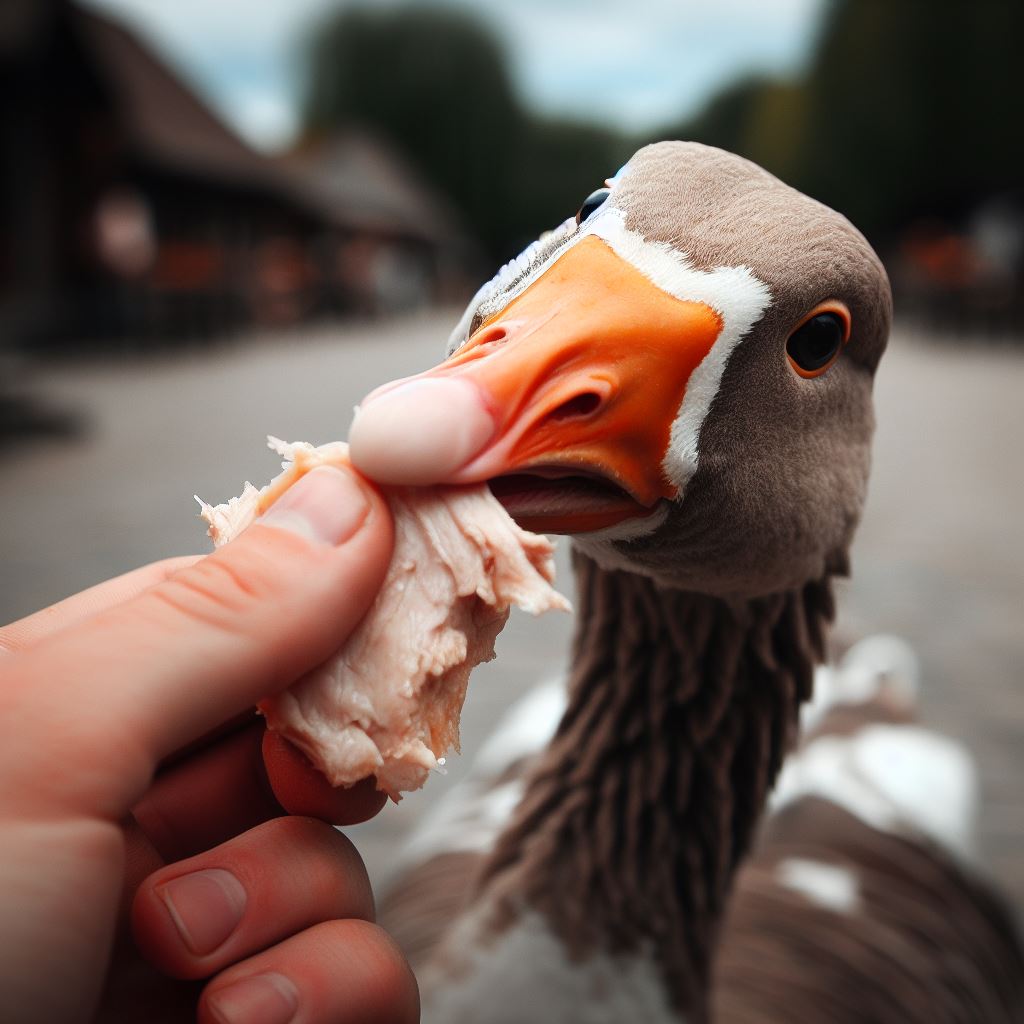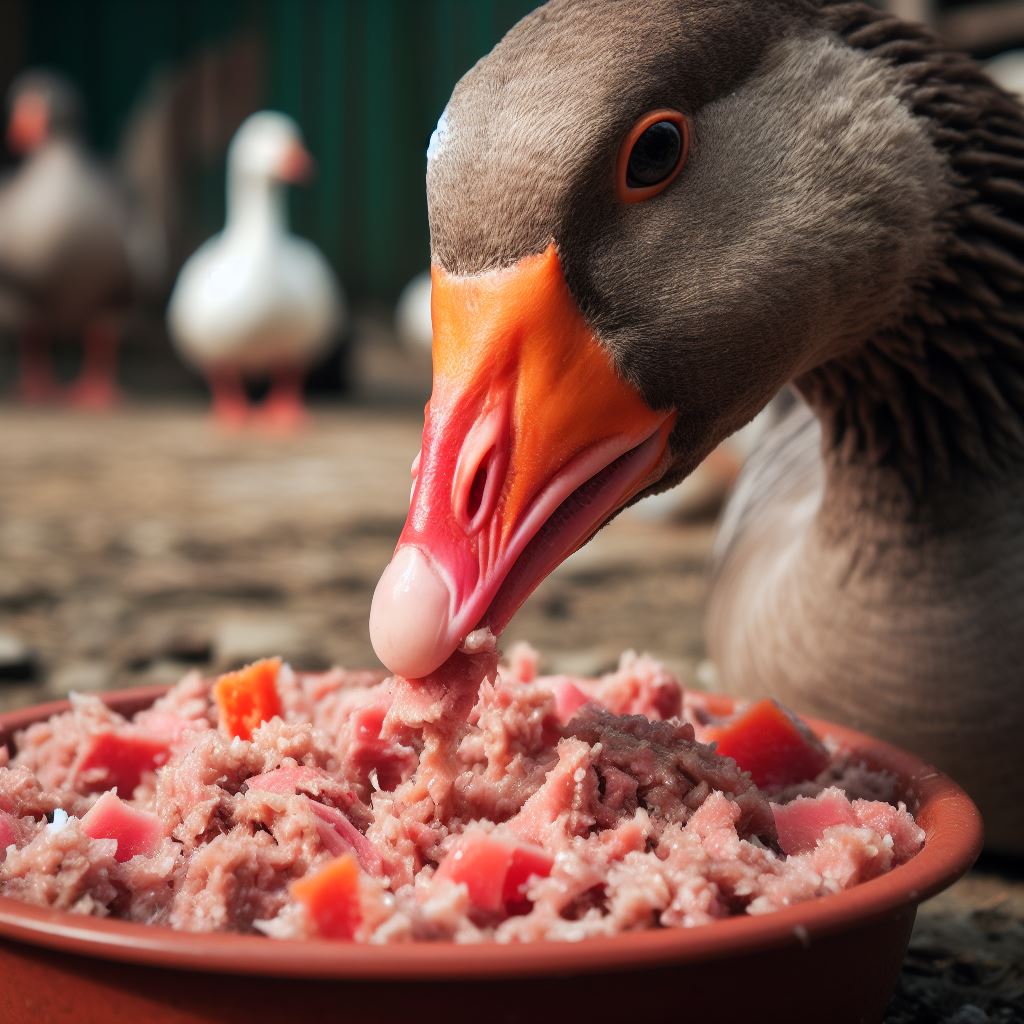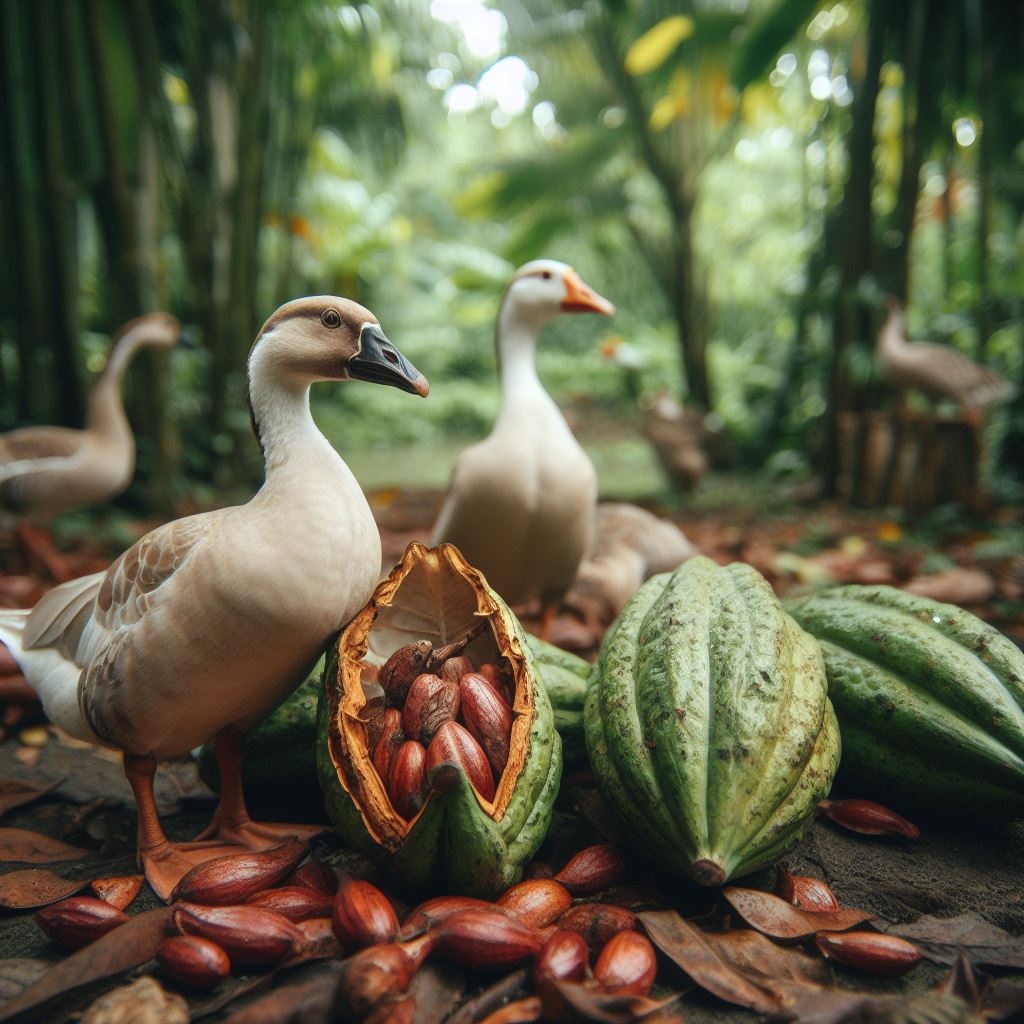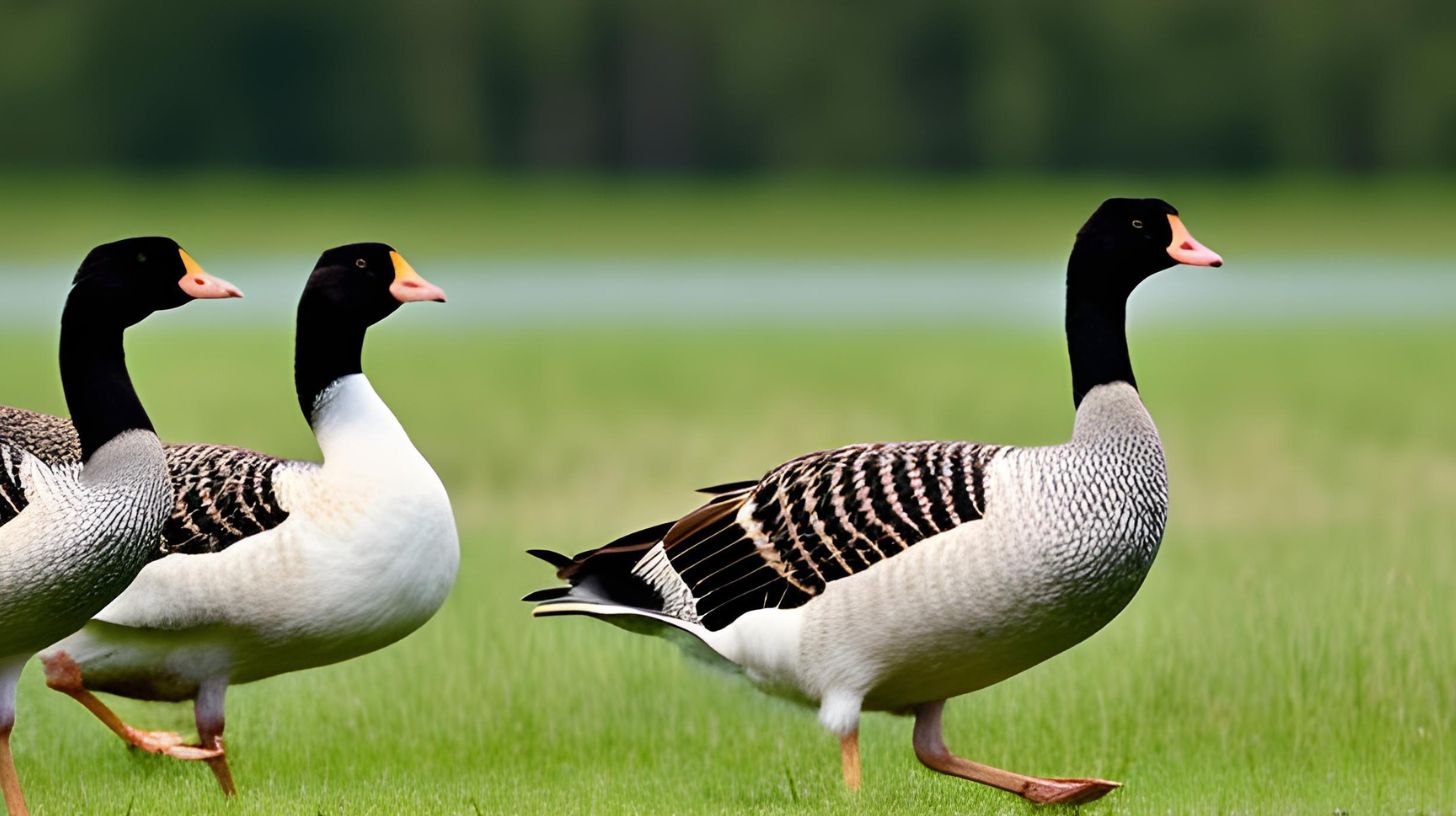Do Geese Eat Meat? The Answer May Surprise You

Table of content:
Yes, geese do occasionally eat meat. Geese are primarily herbivores, but they will opportunistically eat insects, fish, rodents and even carrion in the wild for added protein and fat.
Domestic geese can eat moderate amounts of cooked chicken, beef or pork as an occasional treat if bones, fat and seasonings are removed.
As a responsible goose owner, it’s important to understand their dietary needs and preferences to ensure your birds remain healthy and happy.
Geese are grazing birds with serrated bills adapted for tearing and eating greens. Their natural diet consists mainly of:
- Grasses – Geese graze extensively on grasses, eating the blades and stems. Grass provides them with carbohydrates and roughage.
- Aquatic plants – Submerged, floating, and emergent water plants are a major part of the goose diet. They provide protein.
- Seeds – Geese eat the seeds of land and aquatic plants to get protein and fat.
- Grains – Corn, wheat, barley, oats, and other grains are relished by geese.
- Vegetables – Geese enjoy leafy greens like lettuce and kale as well as root veggies like carrots.
- Fruits – Geese will sample berries, melons, apples, and citrus fruits.
- Insects – Geese snatch up insects like grasshoppers as they graze. Insects provide extra protein.
This vegetarian diet is supplemented occasionally by small aquatic creatures, fish, amphibians, and even carrion or meat.
Do Geese Naturally Eat Meat?
In the wild, geese are primarily herbivorous but do display omnivorous tendencies at times. Here are some instances where wild geese eat meat:
- Carrion – Geese may feed on dead fish, frogs, and other carrions along shorelines.
- Insect larvae – Geese probe the mud with their beak to search for protein-rich insect larvae.
- Rodents – On rare occasions, geese have been observed eating voles, mice, and other rodents.
- Bird eggs – When nesting near shorelines, geese may eat the eggs of other ground-nesting birds.
- Frogs and salamanders – Geese stalk and consume small amphibians near the water.
- Small fish – Geese use their serrated beak to grasp and swallow fingerlings and other small fish.
So in their natural environment, geese do consume small amounts of meat opportunistically as a source of fat and protein. This behavior is more frequent during migration and winter when vegetarian food is limited.
 Can Geese Eat Chicken, Beef, or Pork?
Can Geese Eat Chicken, Beef, or Pork?
Most domestic geese thrive on a vegetarian diet and do not require meat. However, they are naturally curious and may attempt to eat meat if they see their human owners consuming it. Here are some insights on offering domestic geese occasional treats of chicken, beef, and pork:
- Chicken – Shredded cooked chicken or turkey makes a good high-protein treat for geese. Go easy on skin and fat.
- Beef – Chopped lean beef or a boneless steak can offer essential iron and minerals. Avoid fatty, salty deli meats.
- Pork – Lean cooked ham, Canadian bacon, or pork loin provide protein. Avoid fatty bacon.
- Deli Meats – Deli meats are typically high in sodium, so feed sparingly. Opt for low-salt, nitrate-free choices.
- Meat Scraps – Leftover cooked meat scraps can be fed to geese as occasional treats. Avoid overfeeding.
- Raw Meat – Geese have sensitive digestive systems unaccustomed to raw meat. Cook meat before feeding.
When offering any new foods, introduce them slowly in small amounts and monitor for any digestive issues. Moderation is key, as too much protein and fat can cause health problems.
Best Practices for Safely Feeding Geese Meat
Here are some tips for safely incorporating the occasional meat treat into your geese’s diet:
- Cook thoroughly – Always cook meat fully to kill any potential bacteria before feeding it. Never offer geese raw meat.
- Remove bones/fat – Bone splinters can puncture the throat or gastrointestinal tract. Excess fat can cause diarrhea. Remove them before feeding.
- Chop/shred – Cut meat into bite-size pieces for easier eating and digestion. Shredding also allows you to mix in with their regular food.
- Avoid seasoning – Seasonings and marinades can irritate a goose’s sensitive digestive system. Plain cooked meat is best.
- Rinse salty meats – Deli meats and ham are high in sodium, so rinse before feeding to geese.
- Limit portion size – A handful of chopped meat once or twice a week is sufficient. Too much can cause diarrhea.
- Supervise – Stay nearby when offering meat treats. Choking is unlikely but possible if geese gobble chunks too big.
With proper precautions, the occasional scrap of cooked meat can be a safe, nutritious supplement to a goose’s vegetarian diet without disrupting their digestive health. Moderation and variety are key.
Healthy Treats and Supplements for Geese
In addition to the odd piece of meat, geese enjoy many other healthy treats and supplements:
Fruits/Veggies: Chopped dark leafy greens, squash, peas, berries, melons, apples.
Grains: Whole oats, brown rice, quinoa, barley.
Miscellaneous: Hard boiled eggs, unsweetened yogurt, grated cheese.
Supplements: Probiotics, digestive enzymes, omega fatty acids, avian vitamins.
These items provide beneficial nutrients and antioxidants. Offer treats in moderation, accounting for 10% or less of total food intake.
Signs Your Goose Is Eating Too Much Meat
It’s easy to overindulge geese with tasty treats. Here are signs your goose may be getting too much meat or protein:
- Increased droppings and diarrhea
- Loss of appetite for normal vegetarian diet
- Undigested food visible in droppings
- Straining or difficulty defecating
- Dehydration
- Weight gain or abnormal fat deposits
If you notice any of these symptoms, cut back on high-protein foods and call your avian veterinarian if symptoms persist. Some diarrhea is normal when changing diet but should resolve within 48 hours.
Best Practices for a Balanced Goose Diet
Here are some tips for providing your geese a healthy, balanced diet:
- Offer free-choice greens – Stock pens with grasses, sprouts, leafy greens.
- Provide a quality pellet – Choose a comprehensive formula with 18% minimum protein.
- Supplement with grains – Whole grains supply carbs – mix with pellets or offer free-choice.
- Ensure grit – Provide insoluble grit to aid digestion of fibrous foods.
- Offer a vitamin supplement – An avian multivitamin provides added nutrition insurance.
- Feed treats in moderation – Offer fruits, veggies, and the odd scrap of meat sparingly.
- Ensure plenty of fresh water – Change water daily to encourage drinking. Add electrolytes during heat waves.
- Consult an avian vet – Have your vet evaluate your feeding program to catch any nutritional deficits.
With a balanced, varied diet centered on quality pellets and free-choice forage, domestic geese thrive without the need for excessive treats or meat.
Frequently Asked Questions About Geese and Meat
Can I feed chicken eggs to my goose?
Yes, cooked chopped eggs make a nutritious, protein-rich treat. Scrambled or hard boiled is best.
How often can I give a goose deli meat?
No more than once a week, as these meats are very high in sodium. Rinse before feeding.
Is it safe to toss goose scraps from our dinner?
Cooked meat scraps are fine. Avoid bones, excess fat, and seasoned items. Never feed raw goose meat.
Can too much protein hurt my goose?
Yes, excess dietary protein can disrupt uric acid excretion leading to gout-like symptoms. Moderation is key.
Do goslings require more protein than adults?
Yes, goslings need about 20% protein to support rapid growth vs. 12-18% protein for adults.
Should I change my goose’s diet seasonally?
Yes, offer more pellets and grains in winter when forage is limited and more greens and treats in the summer.
Conclusion
In the wild, geese are primarily vegetarian grazers but do opportunistically eat small amounts of meat as a source of fat and protein.
Domestic geese do not require meat in their diet, but many enjoy the occasional treat of cooked chicken, beef, pork or other meat in moderation.
Avoid raw meat, bones, excess fat and seasonings. While geese relish protein-rich treats, overindulging can disrupt their digestive health.
For good health, offer a balanced diet centered on greens, pellets and grains supplemented by moderate amounts of wholesome treats. With proper care and feeding, your domestic geese can live a long, healthy life on a primarily vegetarian diet.
Welcome. I’m Adreena Shanum, the proud owner of this website, and I am incredibly passionate about animals, especially poultry. I founded adreenapets.com as a labor of love, stemming from my desire to share my knowledge and experiences with poultry enthusiasts worldwide.




